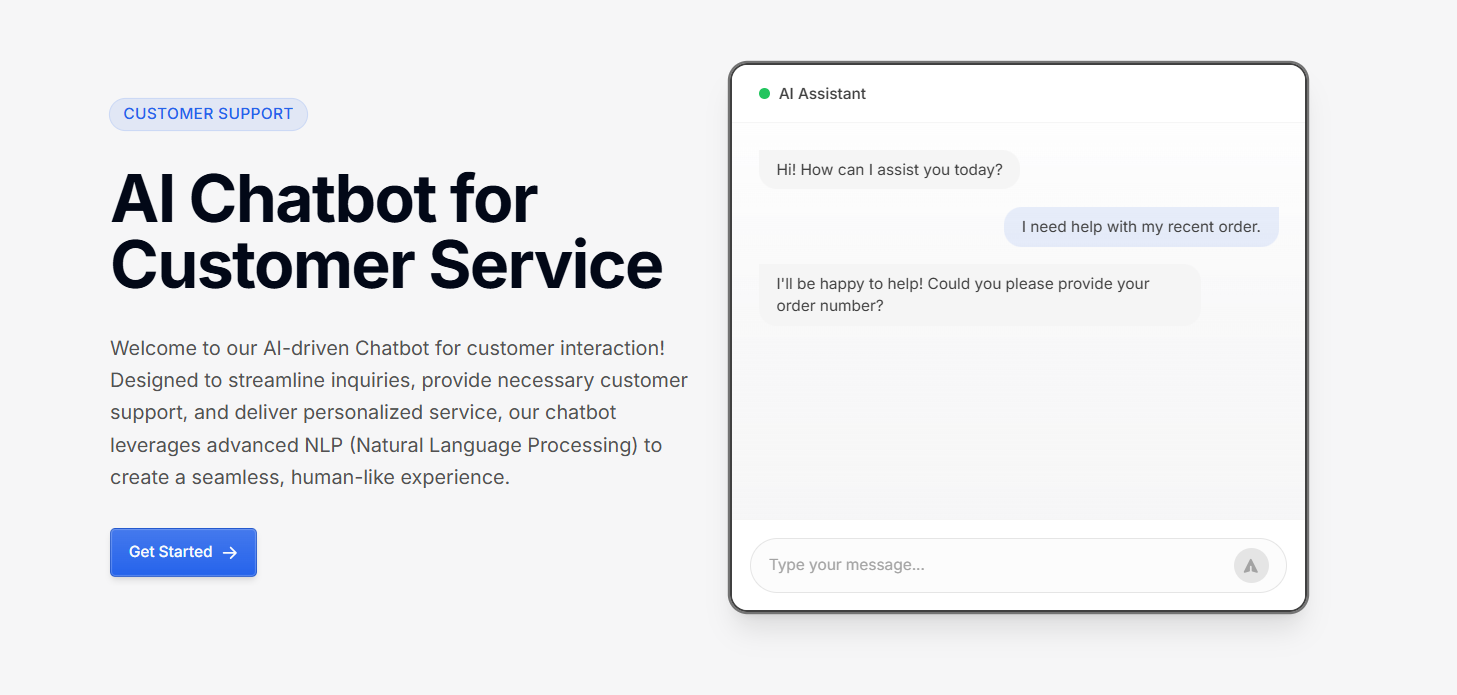
5 Best Customer Service AI Tools For Improved Support

Handling customer inquiries remains one of the biggest challenges for support teams.
Long wait times frustrate users, and repetitive tasks can drain your team’s time and focus. Many businesses are now turning to a smarter solution.
Customer service AI tools are designed to help your business respond faster, reduce repetitive work, and support customers with less strain on your team. These tools are powered by systems that learn from real conversations and improve over time. For real estate agents, an AI virtual assistant can handle lead follow-up, scheduling, and client inquiries around the clock.
In this article, we'll take a closer look at what customer service AI tools can do and how they're helping teams expand support without sacrificing quality. We'll also highlight five of the best tools to help you choose the right fit for your business. If you need a turnkey solution, explore our customer service chatbot that automates up to 70% of support tickets.
5 Best AI Customer Service AI Tools#
The demand for faster, smarter customer support continues to grow, and AI customer service tools are helping businesses meet those expectations without adding headcount.
Below are five of the best customer service AI tools, each offering unique features to help teams deliver reliable and timely support.
1. DenserChat by Denser#
DenserChat is a modern customer service chatbot designed to handle complex issues with accuracy and adaptability.
A chatbot on your website built on semantic AI goes beyond keyword matching to understand the true intent and context of customer questions. It answers with relevant replies, even when customers use unexpected phrasing or uncommon wording.

One of its standout strengths is its high level of control. Teams can customize dialogue flows, behavior, and logic to reflect their support style and business requirements.
You can define responses, connect external systems, and shape how the bot handles every type of customer interaction.
DenserChat integrates with widely used platforms like Shopify, WordPress, and Zapier, which makes it easy to deploy without disrupting your existing workflows. It uses your internal documents and knowledge base to generate responses, complete with source links for transparency.
It has built-in analytics that offer detailed insights into customer behavior, where they get stuck, and what can be improved. This data supports broader goals across marketing, product, and support operations.
Sign up for a free trial or schedule a demo with Denser today!
2. Zendesk AI#
Zendesk AI is built into the Zendesk platform and offers tools to automate routine tasks across channels. It can handle repetitive inquiries using intelligent bots and provides 24/7 support without the need for human intervention.
Its AI Copilot suggests replies and next steps to help agents work faster and stay consistent. Features like intelligent triage and automated content generation allow support agents to route tickets, match tone, and expand notes into full help articles.
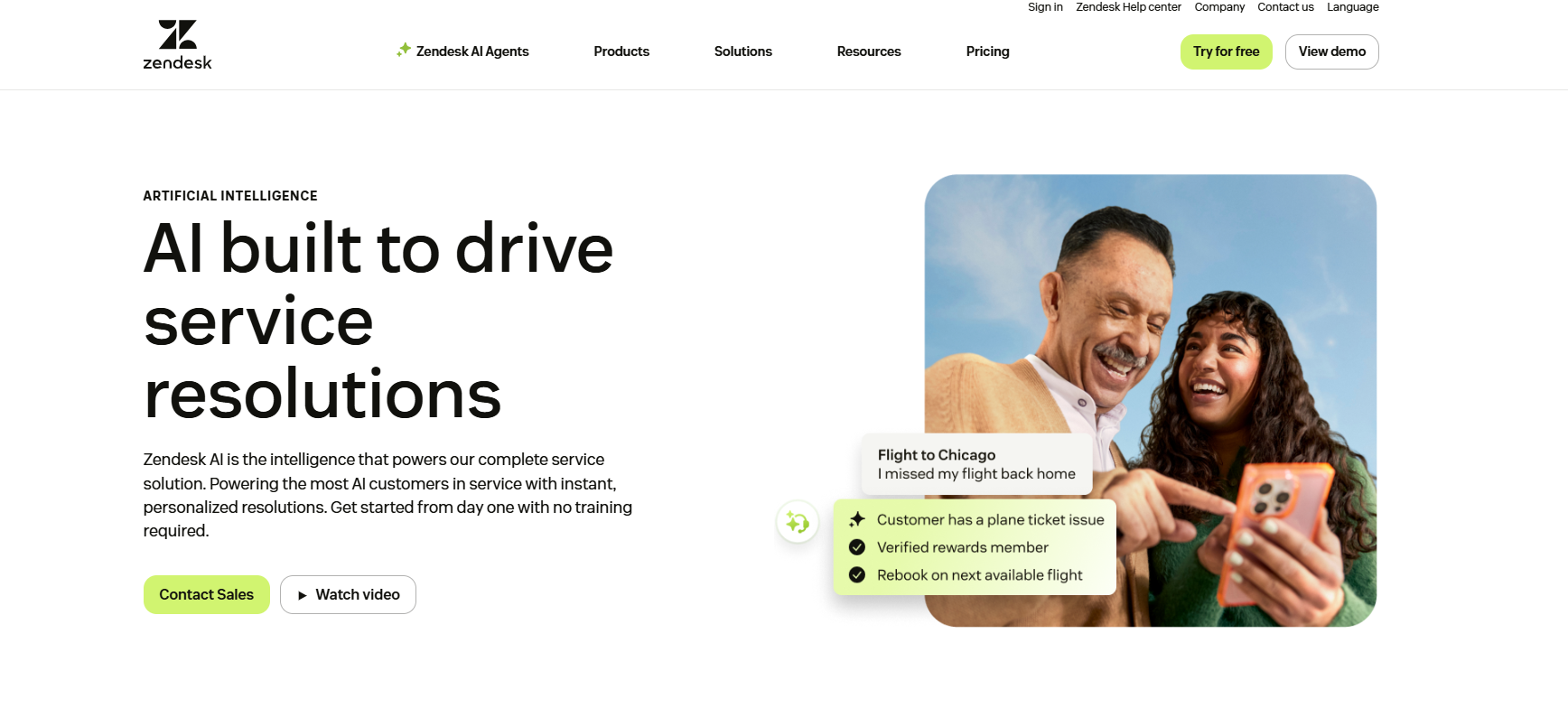
Image Source: zendesk.com
However, users on G2 report missing features such as child-ticket handling and limited flexibility in customizing AI workflows. The platform's setup can also feel time-consuming for new users.
One user also noted that the AI takes time to learn from company content and lacks an option to upload documentation for training quickly.
3. Intercom Fin#
Fin is a conversational AI tool by Intercom that integrates with Intercom’s support teams. It’s designed to handle customer queries by pulling information from multiple sources such as help articles, internal documents, and web pages.
Fin operates across various channels, including chat, email, voice, and SMS, and supports over 45 languages with real-time translation. Additional features include Fin Vision for image understanding and Fin Tasks for automating multi-step actions.
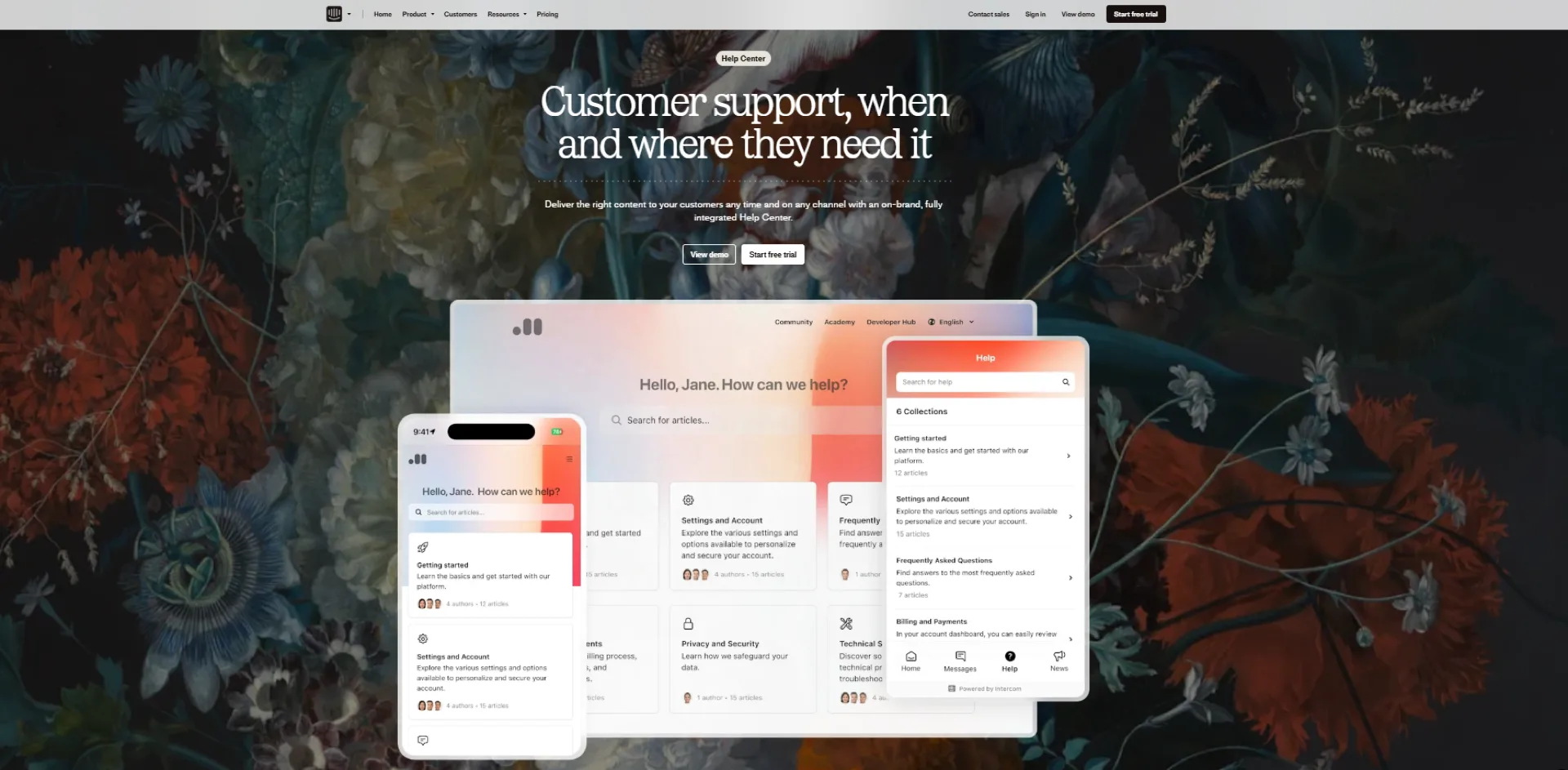
Image Source: fin.ai
Despite its capabilities, a few users report that Fin can sometimes return inaccurate responses that need human agents to review. Others mention that the wide range of options can make setup and management feel complicated.
One common complaint is the lack of support for running separate bots under different brand accounts. These limitations suggest that while Fin is powerful, it still requires hands-on setup and regular tuning to maintain peak efficiency.
4. Freshworks' Freddy AI#
Freshdesk has an AI suite, which includes three components: Freddy Self-Service for public-facing chatbots, Freddy Copilot for personalized support, and Freddy Insights for reporting and trends.
Its virtual agent Freddy AI handles common customer requests across web, chat, and messaging platforms. Freddy Copilot assists agents by summarizing tickets, suggesting responses, and auto-filling fields based on customer feedback.
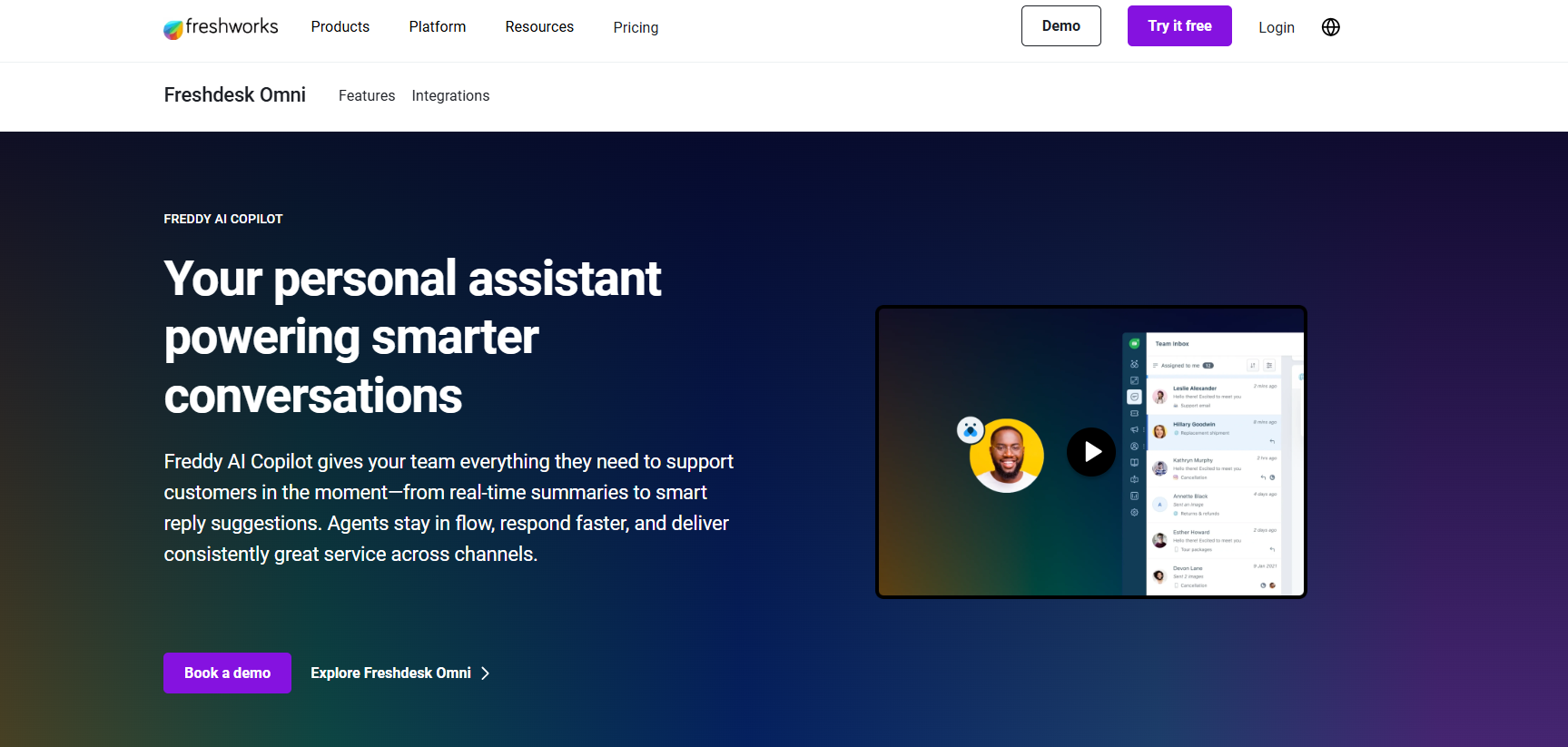
Image Source: freshworks.com
Freddy Insights tracks sentiment and ticket patterns, offering data-driven suggestions for improvement. These tools are built into Freshdesk’s platform and aim to optimize response times and reduce wait times in support.
One drawback is that Freddy AI features are limited to higher-tier plans. Key tools like the chatbot and Copilot are only available from the Pro plan upward, and generative AI features cost extra per agent. This may not suit smaller enterprise teams with limited budgets.
5. Lyro by Tidio#
Tidio offers an AI chatbot called Lyro that responds to customer needs across live chat, email, and messaging platforms like Facebook Messenger.
Lyro uses your existing support content to generate answers. The system also supports multiple languages and automates tasks like checking order status, creating support tickets, and making product recommendations.
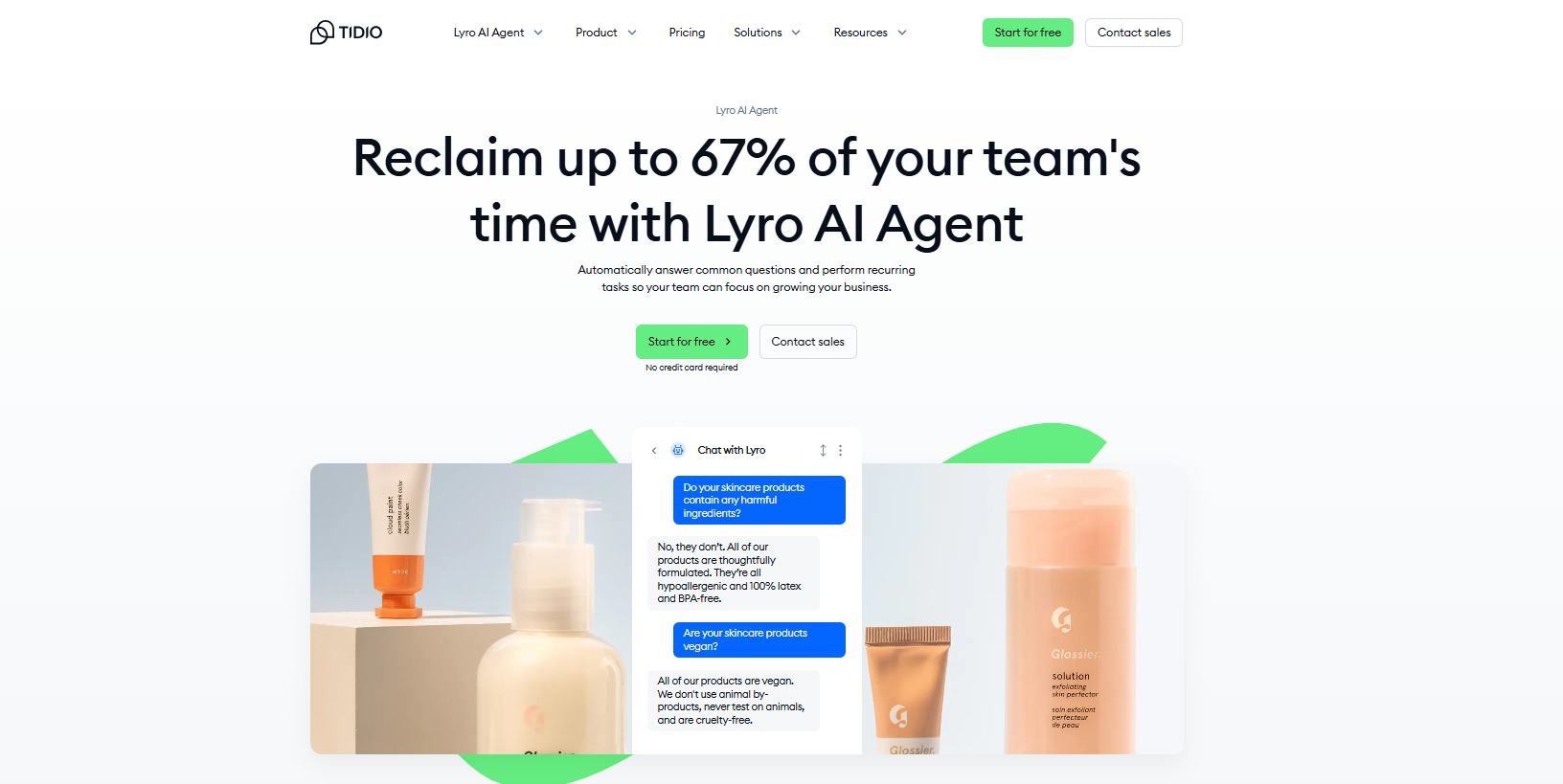
Image Source: tidio.com
While Lyro is easy to use and accessible, pricing can rise quickly with usage. After the free trial and lower-tier plans, higher volumes of AI conversations and premium features may require more investment.
Others report that the chatbot can struggle with edge cases, requiring human support. A few users also mention limitations like mobile app issues and fewer customization options based on preferences.
Why Use AI Tools in Customer Service?#
The volume of tickets, chats, and emails can rise quickly, especially during product launches, sales events, or seasonal peaks. Responding to every customer promptly becomes more challenging, and hiring additional agents isn't always the best solution.
Customer service AI tools are built to help you answer more customers without adding pressure to your team. According to Gartner, generative AI, digital customer service, and conversational user interfaces (CUIs) will transform customer service and support by 2028.
As customer expectations keep changing, AI is becoming a strategic necessity for providing fast and effective support experiences. One of the key benefits of AI in customer service is the ability to handle large volumes of requests while maintaining quality.
Among the most practical solutions are AI chatbots, which are automated assistants that answer questions, guide users, and complete tasks through natural conversation.
The best website chatbot can reduce pressure on your agents and make support more available across time zones and platforms.
The following breakdown of customer service AI tools will help you compare their features and limitations so you can choose the best fit for your business.
Why Is Denser Built for Better Customer Service?#
Denser brings together smart chatbot automation, real-time support, and flexible setup to meet the demands of modern customer service teams.
While many AI platforms focus on basic automation, Denser is built to understand context and support enhancing customer satisfaction through more thoughtful responses.
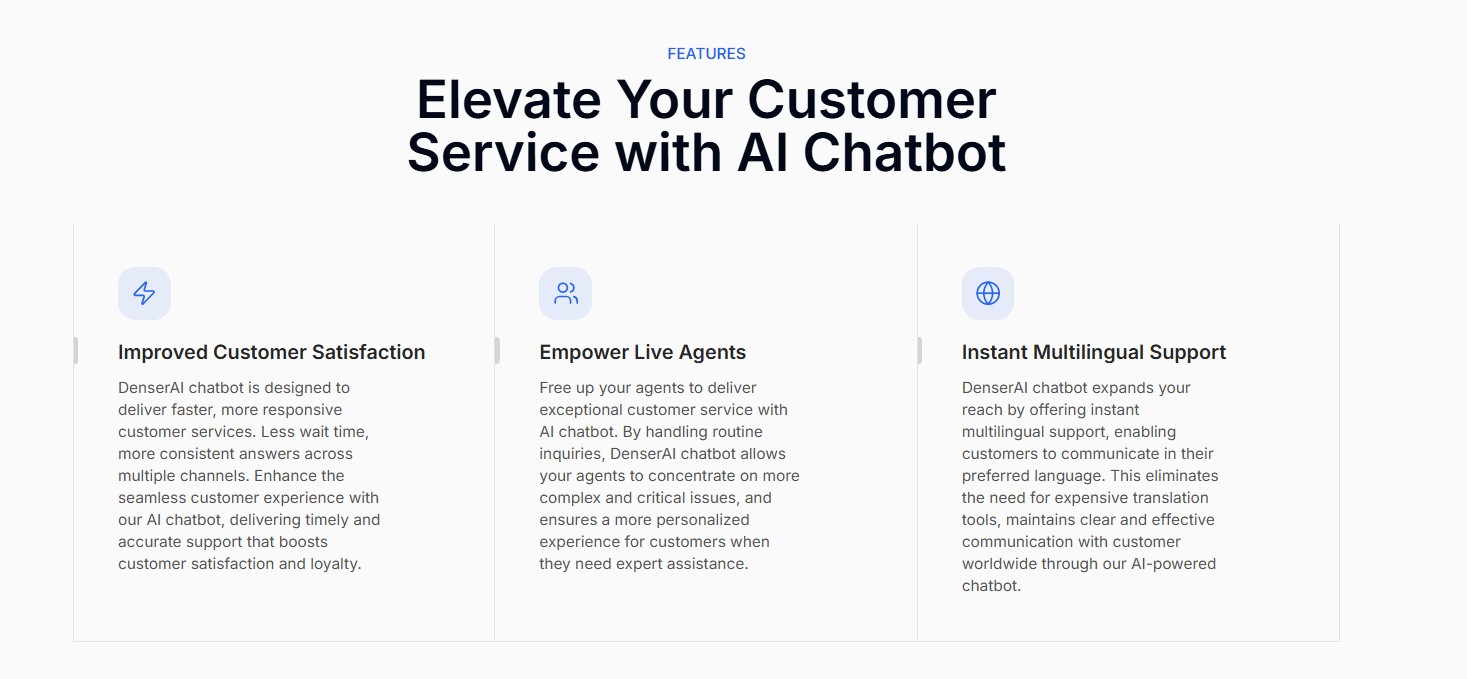
DenserChat runs 24/7 to give your customers immediate access to support no matter the time or location. It relies on advanced natural language processing (NLP) to understand customer intent and resolve common issues, which cuts down on repeated back-and-forth.
One of its standout features is contextual memory. Denser remembers past interactions, which allows it to carry on conversations without needing customers to start over. It creates a smoother and more personal experience that leads to exceptional customer experiences.
Denser also adapts to your growth. If you're supporting a handful of customers or thousands, it delivers consistent, brand-aligned responses tailored through intelligent customer segmentation.
Using Generative AI to Answer Customers Better#
Denser uses generative AI to craft meaningful responses based on real customer data and past interactions.
Unlike bots that rely on scripts or simple triggers, Denser generates replies that align with the tone and context of each message, which results in a tailored and helpful customer experience.
Customers receive timely, well-formed replies that feel personal, driving stronger personalized interactions. This is all powered by the underlying artificial intelligence engine that ensures accuracy, consistency, and context-awareness.
Free Your Support Teams From Repetitive Tickets—Try Denser!#
Experience the benefits of scaling support without scaling headcount. Denser helps you manage high volumes of support questions by responding instantly and guiding users with accurate answers.
It connects with platforms like Shopify, WordPress, and Slack, and setup takes only a few minutes. You can shape how it responds, train it with your content, and track performance through precise analytics.
Denser’s no-code setup, built-in analytics, and deep integrations make it easier for support teams to train and manage the bot without slowing down operations. This gives your team the support of AI agents without adding complexity.
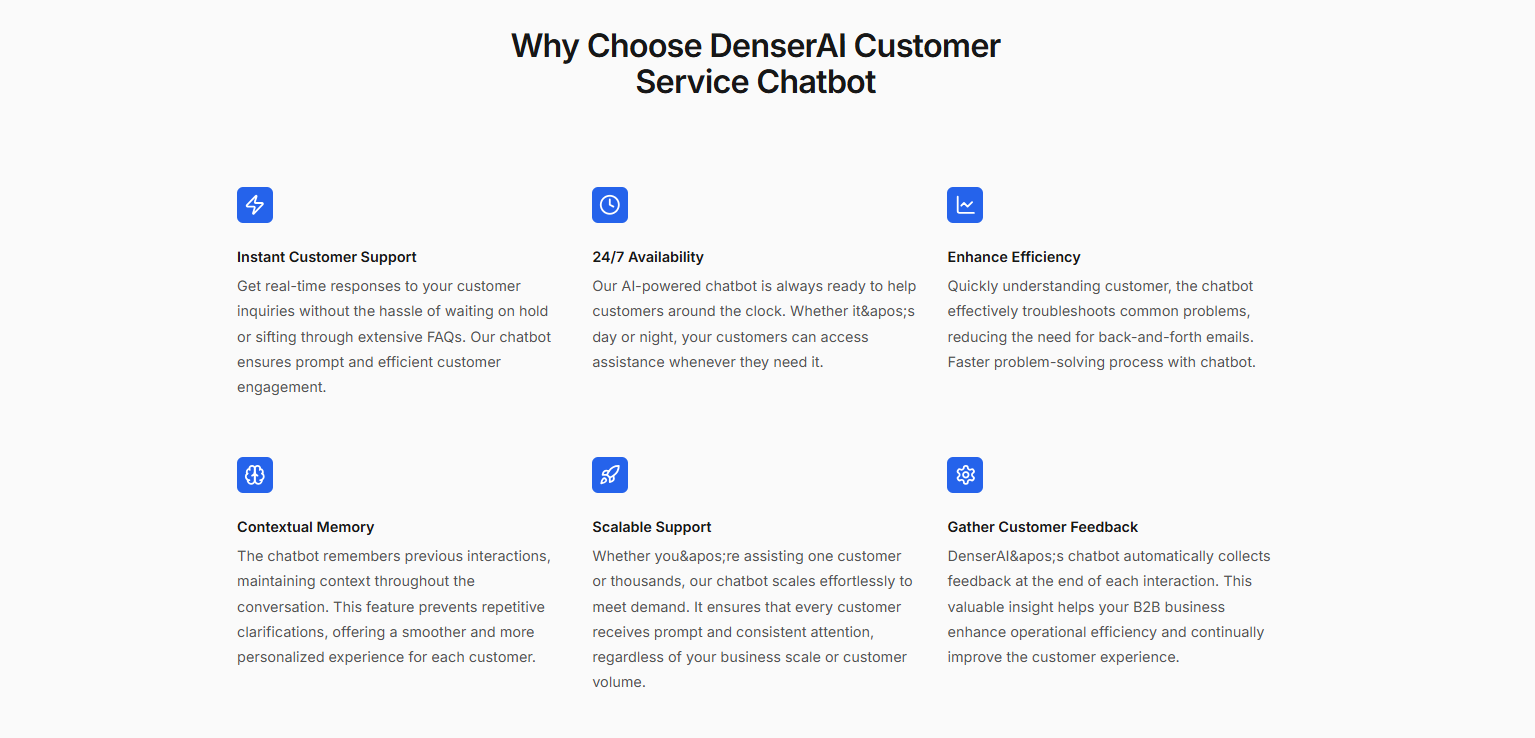
Denser grows with your business and takes pressure off your team. Sign up for a free trial or schedule a demo and deliver faster, more reliable support!
FAQs About Customer Service AI Tools#
What is the best AI software for customer service?#
The best AI software depends on your needs, but DenserBot stands out for its semantic understanding, customization options, and ease of deployment. It supports complex workflows, integrates with common platforms, and adapts to your support content with minimal setup.
What is the AI tool for customer service?#
An AI tool for customer service is software that automates support tasks like answering routine inquiries, routing tickets, and assisting agents.
These solutions use technologies like NLP and machine learning to provide fast and accurate help across channels such as chat, email, or phone.
What kind of AI is used in customer service?#
Most customer service AI tools use NLP to understand messages and machine learning to improve over time. Some platforms feature AI agents built for semantic search and predictive analysis, which help identify patterns and improve resolution quality over time.
Can I use ChatGPT for customer service?#
Yes, you can use ChatGPT for customer service by integrating it into your support stack. However, unlike specialized tools that are optimized for faster response times, ChatGPT may require more training and guardrails to operate smoothly.
Purpose-built tools like Denser are more efficient when you need to deliver personalized support that aligns with your brand voice and customer expectations for accuracy and tone.